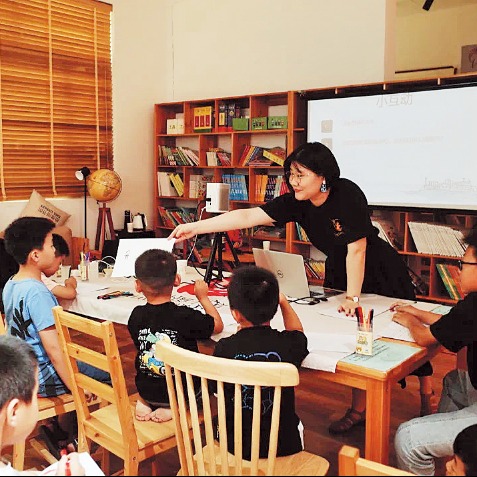



During the two sessions in Beijing, a first-of-its-kind proposal was the talk of the town in education circles.
Dai Liyi, a member of the Chinese People's Political Consultative Conference National Committee and vice-president of East China Normal University, proposed that schools begin cultivating the social and emotional skills of primary and secondary school students, citing that such skills are crucial to their development.
He pointed out in the proposal that curiosity, a sense of responsibility and perseverance have a positive impact on academic performance, while the abilities to communicate well and control one's emotions can also be a boon to well-being and life satisfaction.
"Social and emotional abilities play a decisive role in helping people adapt to the rapid development of society, achieve career success and happiness in life," said Dai, noting that the importance of social and emotional learning is not receiving enough attention in schools at the moment.
Dai's claim is backed by data from the Organization for Economic Cooperation and Development. According to the Study on Social and Emotional Skills by the OECD, Chinese students pale in comparison to their international peers when it comes to handling stress and controlling emotions.
Aimed at determining the factors that influence the formation and growth of students' social and emotional skills, the study was first carried out in 2016.
The evaluation has five major indicators — open-mindedness, task performance, engaging with others, emotional regulation and collaboration.
More than 10 cities from nine countries participated. Among these cities was Suzhou, Jiangsu province, which carried out the evaluation in 151 primary and secondary schools. Surveys of parents, teachers and principals were also conducted.
According to Shen Wei, an associate professor of the education department at East China Normal University, which was responsible for carrying out the study in Suzhou, the study found that social and emotional learning has been in China since 2006, when Beijing Normal University cooperated with the UNICEF to trial projects in the country's central and western regions.
However, implementation has not been widespread. Data from East China Normal University shows that although more than 90 percent of the schools in China understand the concept of social and emotional learning and know what is required to conduct such training, only 50 percent of schools have made plans to do so.
"We do have social and emotional learning in our curriculum. For example, current classes on ethics and law, morals and life all teach the same abilities. However, these classes alone are not enough and more still needs to be done," said Shen.
Apart from schools, a number of private institutions also provide related training in China. Among them is Wise Edu Plus. The company's best-selling products are the five study packages designed for children that were developed by the Committee for Children in the United States and adapted for China.
"In China, there is a lot of pressure on kids to succeed academically. This has led to many kids turning inward and struggling to express their emotions. We founded Wise Edu Plus in 2013 to address this issue," said company founder Gui Zhiwei.
"We believe that a truly future-oriented individual needs not only academic knowledge, but also social and emotional skills — how to get along with others, how to look at oneself, how to self-regulate and how to solve problems," added Gui.
"This is why our packages are aimed at helping kindergarten students improve their learning skills, develop empathy, as well as learn emotional management and problem-solving skills."
If you have any problems with this article, please contact us at app@chinadaily.com.cn and we'll immediately get back to you.